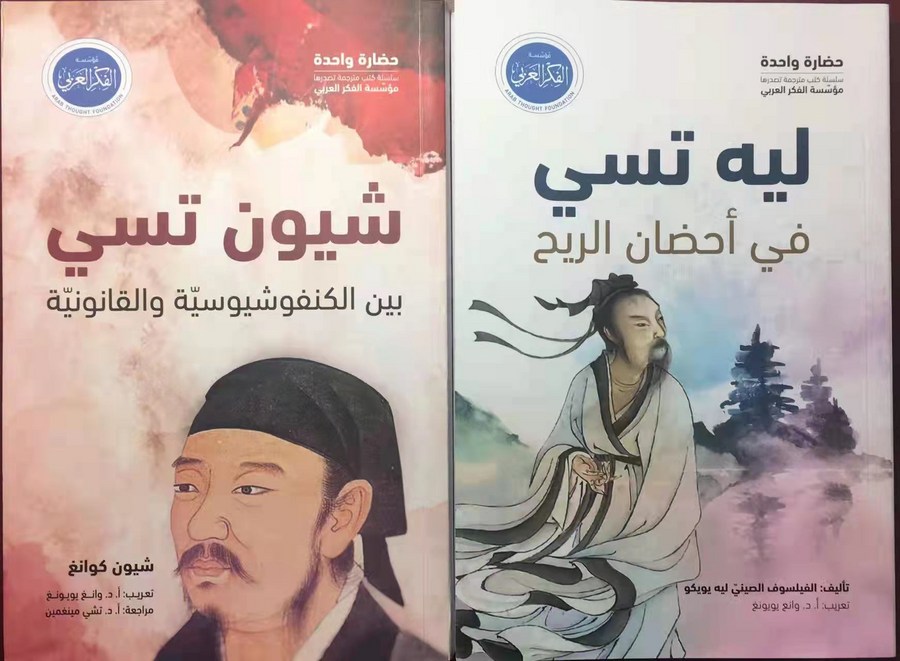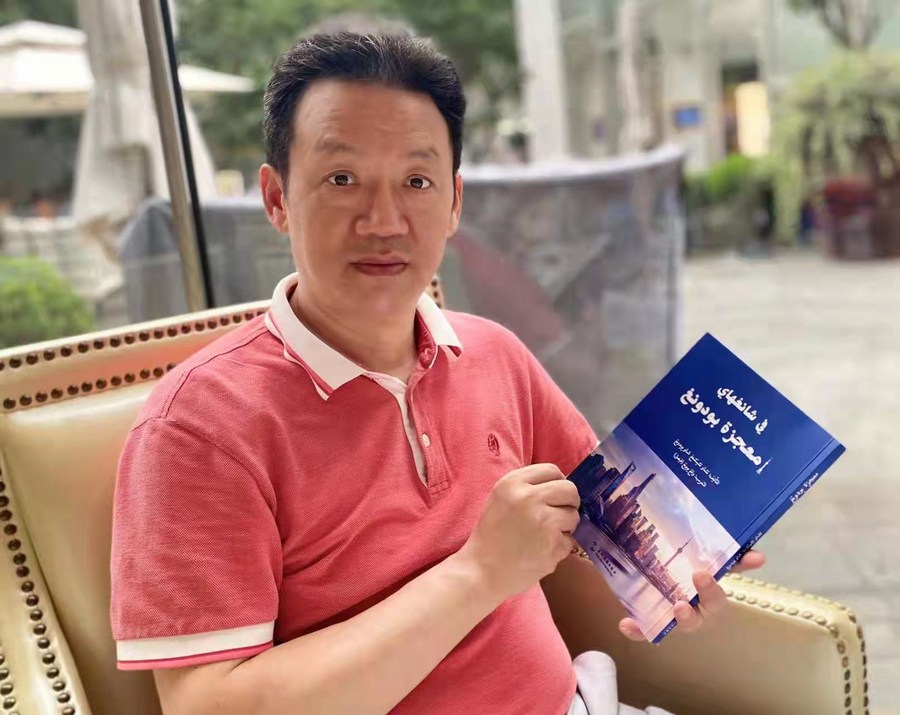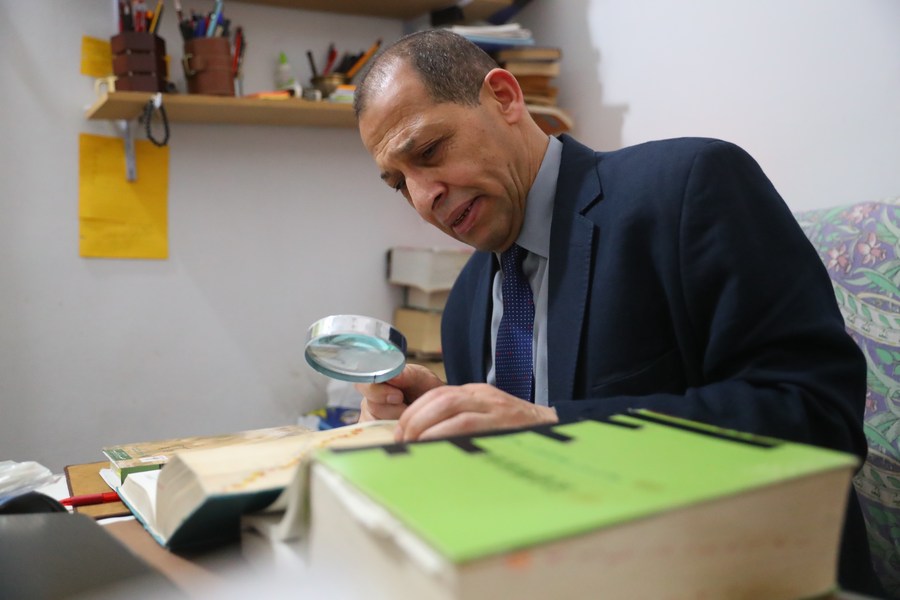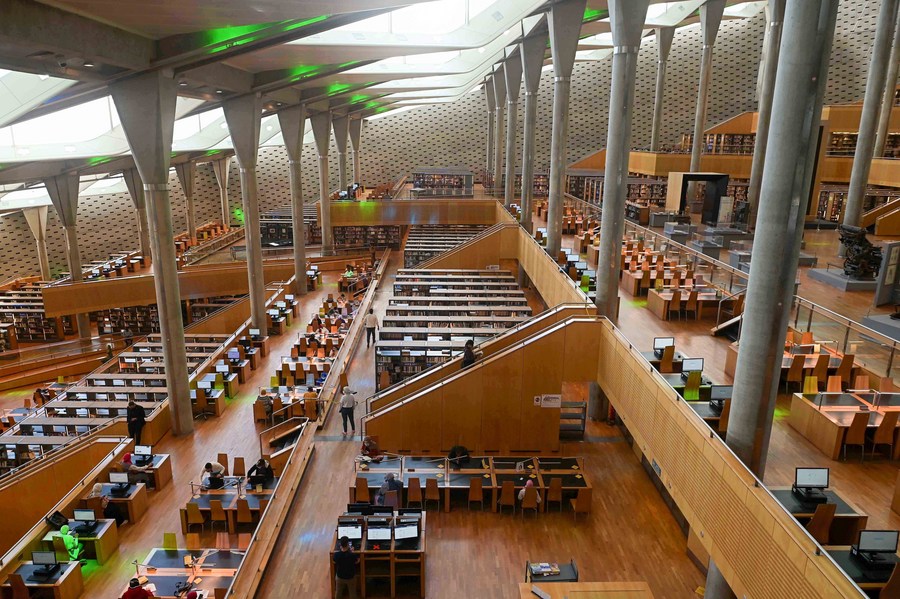Translators, ebooks facilitate Chinese-Arab mutual understanding

The photo shows the books of Xunzi(L) and Liezi(R) in Arabic version. (Photo courtesy of the books' translator Wang Youyong)
CAIRO, April 23 (Xinhua) -- It was 37 years ago when Wang Youyong, now a Chinese-Arabic translator, first noticed some "strange inscriptions" on the tombstone of Puhaddin, a 16th generation descendant of Prophet Mohammad, in the city of Yangzhou in eastern China. He was eager to decode them.
The inscriptions turned out to be Arabic script, and then Wang decided to study Arabic language and literature at university. Three decades later, Wang becomes one of the most prolific Chinese translators devoted to rendering Chinese classics into Arabic.
Thanks to his efforts, more Chinese classic books have reached Arab readers ahead of this year's World Book Day on April 23. Among them are Xunzi, written by the renowned Chinese philosopher Xunzi, Liezi, a Taoist classic, and Caigen Tan, or Cabbage Roots Talk, a popular Confucianism book.

The photo shows Wang Youyong, a Chinese professor of Arabic literature at Shanghai International Studies University, holding the book of Shanghai Pudong Miracle, which was translated by him in Arabic. (Photo courtesy of the books' translator Wang Youyong)
The Arabic edition of Caigen Tan "will definitely be welcomed by Arab readers and make new contributions to deepening mutual understanding between the two peoples," said Ge Tieying, a professor at the University of International Business and Economics in Beijing.
Wang was not alone in introducing Chinese books and culture to Arab readers. In Egypt, Mohsen Fergani, a renowned professor of Chinese literature at the Ain Shams University in Cairo, has also translated several Chinese classics, including The Analects of Confucius, The Book of Poetry and Tao Te Ching, into Arabic.

Mohsen Fergani, a professor of Chinese literature at the Ain Shams University in Egypt, reads books at his home in Cairo, Egypt on April 18, 2022. (Xinhua/Sui Xiankai)
Fergani told Xinhua that nowadays, more and more Arabic books are directly translated from Chinese ones, which have brought Arab readers into a world of Chinese classics brimming with "wisdom, creativity and culture," while in the past, more Chinese works were translated into Arabic through English and French as intermediaries, which made the works lose their original brilliance.
In 2013, Fergani was awarded the Special Book Award of China for his distinguished contribution to promoting China-Arab cultural exchanges. He was the first Arab to receive the honor.
The Chinese government has attached great importance to enhancing China-Arab cultural exchanges and promoting their traditionally friendly ties.

Photo shows a view of the interior of the Bibliotheca Alexandrina in Alexandria, Egypt, on April 19, 2022. (Photo by Ahmed Draz/Xinhua)
In January 2016, a project called "Hundred, Thousand and Ten Thousand Talents," aimed at enhancing the China-Arab friendship, was launched at the Arab League headquarters in Cairo. Under the project, China launched the "Silk Road Book Translation" program for the translation of 100 Chinese and Arab classics.
Hi-tech has also facilitated the project, which is popular among publishing houses which have introduced both printed copies and ebooks of Chinese and Arab classics, said Dong Yu, director of the digital publishing department at the book publishing center under the China Intercontinental Press.
"That's Books," a digital reading platform containing more than 100 ebooks and audio books from China and Arab countries, has topped the rankings of Arab digital reading platforms. The platform has been hailed by many Arab ebook lovers as "a Chinese gift for Arab readers."
Ebooks, which offer readers faster access to the latest publications and enable them to use more reading tools, have enriched the content of the World Book Day, Dong told Xinhua.
It's fascinating to watch how the digital world, such as ebooks, has aided a number of translators in conveying messages from one culture to another, said Yang Xue, deputy director of the international cooperation department at the book publishing center under the China Intercontinental Press.
"In our case, ebooks are helping China and the Arab countries to carry out dialogues in a spirit of inclusiveness and mutual learning, and we are happy to see this," she told Xinhua.
Echoing Yang's remarks, Egyptian writer and novelist Saeed Noah said, "Communication between two cultures creates new thoughts, and I certainly encourage cultural communication between the two very glorious civilizations (China and Egypt)."
(Yao Bing and Mahmoud Fouly in Cairo also contributed to the story.)


